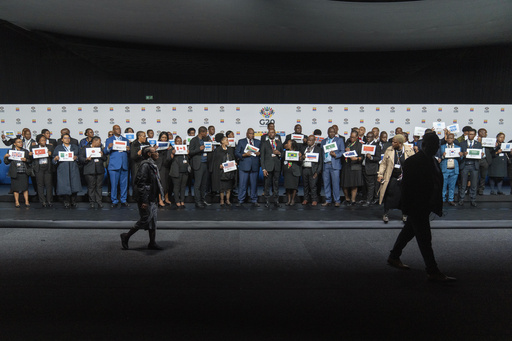
In Johannesburg, high-ranking diplomats and foreign ministers from both affluent and developing nations convened on the final day of their meeting to discuss pressing global disputes, with a principal focus on the ongoing Russia-Ukraine conflict. The two-day event, hosted by South Africa as the first African nation to preside over the G20, proceeded despite the noticeable absence of a significant U.S. delegation.
South African officials attempted to downplay the absence, with President Cyril Ramaphosa emphasizing that meaningful discussions had taken place, aided by acting U.S. ambassador Dana Brown’s presence. Ramaphosa stated that the objective of the meeting was to foster “serious dialogue” amid the backdrop of various wars, the climate crisis, and challenges related to energy and food security. The United States is poised to assume the G20 presidency following South Africa’s term in the upcoming year.
After the conclusion of the meeting, South African Foreign Minister Ronald Lamola addressed the media, highlighting how ongoing conflicts in regions such as Africa, the Middle East, and Europe hinder economic progress. He reiterated that all member states are required to act in accordance with the principles set forth in the U.N. charter and expressed a collective intent to support peace initiatives addressing the war in Ukraine, the Israel-Hamas conflict, and tensions in Sudan and Congo.
Lamola also revealed that South African President Ramaphosa has extended an invitation to Ukrainian President Volodymyr Zelenskyy for an official visit, noting that the two leaders have previously met at various international forums. He firmly advocated for Ukraine’s participation in peace negotiations, stating, “We firmly believe that any peace negotiations should be inclusive, ensuring that Ukraine’s voice is clearly represented.”
The meeting highlighted contrasting perspectives on the conflict. Russian Foreign Minister Sergey Lavrov attributed the war in Ukraine to the actions of Western nations, while U.K. Foreign Secretary David Lammy remarked on the apparent lack of commitment from Russia towards achieving peace. Lammy commented, “Listening to Lavrov, I don’t perceive any genuine desire for peace from their end.”
Moreover, French Foreign Minister Jean-Noël Barrot noted the potential repercussions if Ukraine were to yield, warning that it could send a detrimental message to other nations vulnerable to aggression from more powerful neighbors. Claver Gatete, a representative from the U.N.’s economic commission for Africa, pointed out that global conflicts affect African nations, citing the increase in inflation and food prices since the onset of the Russian invasion of Ukraine three years prior. “Wherever conflict arises, it has repercussions for Africa,” Gatete asserted.
South Africa is set to host the G20 Leaders’ Summit in November, where heads of state from G20 nations are expected to convene.

